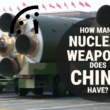No-first-use: Best to maintain ambiguity
By Raymund Jose G. Quilop |
Instituting a no-first-use policy would represent sound judgment by Barack Obama—at least in terms of international politics. This policy shift would to some extent reconcile Obama's quest for eventual nuclear disarmament with the formidable nuclear arsenal that Washington still possesses. It would provide a sense of consistency with Obama's 2009 declaration that the United States would "seek the peace and security of a world without nuclear weapons"—and with Obama's own concerns about nuclear security, demonstrated through the series of Nuclear Security Summits that he initiated.
Pronouncements such as the declaration of a no-first-use policy provide useful indications about the policy thrusts of governments in general and administrations in particular. They help countries better understand each other's defense policies and postures. They serve as confidence-building measures—which, at least according to their advocates, can enhance global peace and stability and reduce both tensions and trust deficits among competing powers. Still, a no-first-use declaration by the United States would be merely a declaration. Would it really do anything substantive to keep the nuclear peace? I tend to doubt it.
Adversaries and allies. Some argue that the only purpose of nuclear weapons is to deter a first strike by another nuclear-armed state. They argue that nuclear weapons' deterrence capacity lies in the ability to launch a second strike, not a first one. I believe otherwise—that nuclear attacks are deterred both by the ability to strike back and by the readiness to strike first. If a nation is perceived by adversaries as having "one arm deliberately tied behind its back," as Arthur Herman of the Hudson Institute has written, those adversaries may actually be encouraged to strike first, targeting nuclear assets in the process. If that's the case, declaring a no-first-use policy would undermine nuclear deterrence.
Then again, preemptive nuclear attack is not the only type of aggression that must be deterred. Take China's territorial claims in the South China Sea as an example. Washington's avowed policy is not to take sides in disputes over territory in the South China Sea, but Beijing perceives the United States as having taken up the cudgel for Southeast Asian nations, specifically the Philippines and Vietnam. Would the United States ever use nuclear weapons first in a conflict with China over the South China Sea? Perhaps not, but a no-first-use policy would remove all doubt in Beijing. Thus China might pursue its territorial claims even more aggressively—notwithstanding the Permanent Court of Arbitration's July ruling that the "nine-dash line" on which Beijing bases its broad claims in the South China Sea has no foundation in international law.
A no-first-use policy might also lead to greater aggressiveness in Pyongyang. Though North Korea has always argued that the US nuclear threat is among the fundamental reasons for its own pursuit of nuclear weapons, it would be naïve to think that Pyongyang would abandon nuclear weapons just because Washington adopted no-first-use. Rather, one can easily imagine a no-first-use declaration emboldening North Korea to pursue its nuclear program even more aggressively. Declaring a no-first-use policy simply sends the wrong message to potential aggressors. The most pragmatic approach is for nuclear weapon states to maintain some ambiguity about whether and why they might use nuclear weapons first—as the United States currently does.
Declaring a no-first-use policy could also undermine the credibility of the nuclear umbrella that the United States extends to its partners, and this could lead allies to produce nuclear weapons of their own. Japan, if it decides to produce nuclear weapons, has both the technology and the fissile material to do so easily. South Korea, with its strong technology base and its large civilian nuclear energy sector, is also eminently capable of developing nuclear weapons. If such scenarios play out—if allies began to doubt US security assurances—no-first-use would contribute to the proliferation of nuclear weapons and undermine efforts to eliminate them.
As already mentioned, some US allies in Southeast Asia harbor concerns about China's territorial claims in the South China Sea. But the Association of Southeast Asian Nations would likely welcome a US no-first-use policy as a step toward establishing Southeast Asia as the true nuclear-weapon-free zone that was envisioned in the 1995 Treaty of Bangkok. The treaty, unfortunately, has not yet been fully realized because the five recognized nuclear weapon states haven't agreed to its associated protocol. Without the protocol, the Southeast Asian Nuclear-Weapon-Free Zone remains merely an idea on a piece of paper.
















